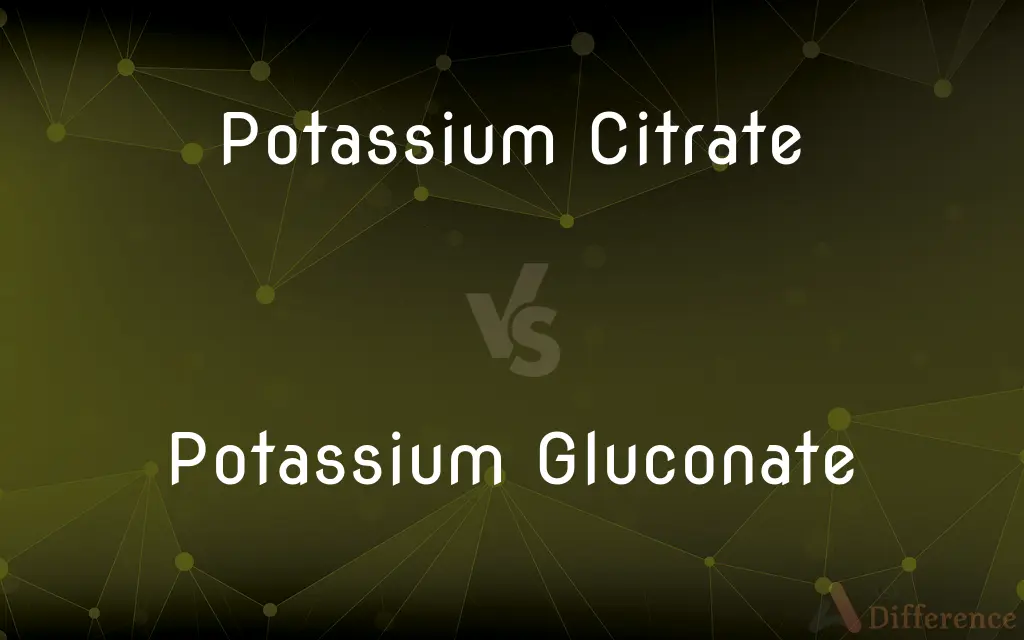Potassium Citrate vs. Potassium Gluconate — What's the Difference?
By Tayyaba Rehman — Published on October 26, 2023
Potassium Citrate is a potassium salt of citric acid. Potassium Gluconate is a potassium salt of gluconic acid. Both are used as dietary supplements but have distinct medical applications.

Difference Between Potassium Citrate and Potassium Gluconate
Table of Contents
ADVERTISEMENT
Key Differences
Chemical Structure & Origin: Potassium Citrate is derived from citric acid, commonly found in citrus fruits. In contrast, Potassium Gluconate comes from gluconic acid, produced from glucose fermentation.
Medical Uses: Potassium Citrate is often prescribed for the prevention of certain types of kidney stones and to alkalize urine. Potassium Gluconate, on the other hand, is commonly used as a potassium supplement, especially in cases of hypokalemia (low blood potassium levels).
Dietary Role: Both compounds serve as sources of potassium in dietary supplements. Potassium is essential for heart, muscle, and nerve functions. However, while Potassium Citrate primarily addresses specific medical conditions, Potassium Gluconate is more generalized in its application as a potassium booster.
Form & Administration: Potassium Citrate is often available in extended-release tablets and liquid forms. Potassium Gluconate is commonly found in over-the-counter supplements in tablet or capsule form.
Potential Side Effects: Both compounds, when taken in excess, can lead to hyperkalemia (excessively high blood potassium levels). However, specific side effects may vary based on the individual and the condition being treated.
ADVERTISEMENT
Comparison Chart
Origin
Derived from citric acid
Derived from gluconic acid
Primary Use
Kidney stone prevention, urine alkalization
Potassium supplementation
Dietary Role
Specific medical conditions
General potassium boost
Form
Extended-release tablets, liquid
Tablets, capsules
Potential Effects
Prevents certain kidney stones
Addresses hypokalemia
Compare with Definitions
Potassium Citrate
Alkalizes urine in medical treatments.
To balance her urine pH, she was given Potassium Citrate.
Potassium Gluconate
Helpful in treating hypokalemia.
For patients with hypokalemia, Potassium Gluconate is a common recommendation.
Potassium Citrate
Essential for maintaining proper muscle and heart function.
Athletes often ensure adequate Potassium Citrate intake for muscle health.
Potassium Gluconate
Supports heart, nerve, and muscle functions.
Ensuring adequate Potassium Gluconate intake can benefit overall bodily functions.
Potassium Citrate
Available in various forms including extended-release tablets.
She opted for the liquid form of Potassium Citrate for easier consumption.
Potassium Gluconate
Often found in over-the-counter dietary supplements.
He bought a bottle of Potassium Gluconate capsules from the pharmacy.
Potassium Citrate
Used medically to prevent certain kidney stones.
The doctor prescribed Potassium Citrate to help with his recurrent kidney issues.
Potassium Gluconate
A potassium salt of gluconic acid.
Potassium Gluconate is derived from the fermentation of glucose.
Potassium Citrate
A potassium salt derived from citric acid.
Citrus fruits are a natural source of Potassium Citrate.
Potassium Gluconate
Primarily used for potassium supplementation.
To combat her low potassium levels, she took Potassium Gluconate tablets.
Common Curiosities
Are both compounds used for potassium supplementation?
Yes, both can serve as potassium supplements, but they have distinct primary applications.
What is the primary source of Potassium Citrate?
Potassium Citrate is derived from citric acid, typically found in citrus fruits.
What is a main medical application of Potassium Citrate?
Potassium Citrate is commonly prescribed to prevent certain types of kidney stones.
Can I get Potassium Citrate from my diet?
While certain foods like citrus fruits contain citric acid, for medical purposes, a concentrated supplement is typically required.
Are there side effects to these supplements?
Side effects can occur, especially with excessive consumption. Always follow recommended dosages.
How is Potassium Gluconate produced?
Potassium Gluconate comes from gluconic acid, often resulting from glucose fermentation.
When might one take Potassium Gluconate?
It's often taken to address hypokalemia or low blood potassium levels.
How do I know if I need a potassium supplement?
It's crucial to consult with a healthcare professional regarding potassium needs and any supplementation.
Can I take both compounds together?
It's crucial to consult with a healthcare professional before combining any supplements.
Which is more widely available over the counter?
Both are available, but Potassium Gluconate is more commonly found in general potassium supplements.
Can I overdose on either compound?
Yes, excessive intake of either can lead to hyperkalemia, a potentially dangerous condition.
Do both compounds support heart health?
Yes, both play a role in maintaining proper heart function.
Which of the two is more alkalizing?
Potassium Citrate has a specific role in alkalizing urine.
Which is better for general potassium supplementation?
Potassium Gluconate is more commonly used for general potassium needs.
Are there natural sources of Potassium Gluconate?
While gluconic acid results from glucose fermentation, the specific potassium salt form is typically produced for supplementation.
Share Your Discovery

Previous Comparison
Educational Technology vs. Information Technology
Next Comparison
MP3 vs. MP4Author Spotlight
Written by
Tayyaba RehmanTayyaba Rehman is a distinguished writer, currently serving as a primary contributor to askdifference.com. As a researcher in semantics and etymology, Tayyaba's passion for the complexity of languages and their distinctions has found a perfect home on the platform. Tayyaba delves into the intricacies of language, distinguishing between commonly confused words and phrases, thereby providing clarity for readers worldwide.












































